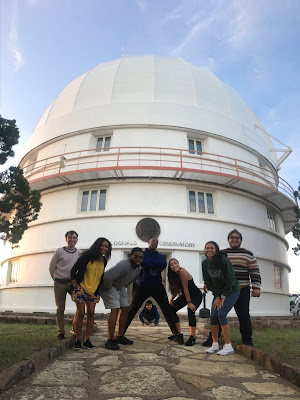 The fifth TAURUS Scholar Spotlight of the summer focuses on Analis Lawrence, who recently graduated from Florida International University with a major in Physics and minors in Astronomy and Mathematics. She will be attending the University of Florida as a graduate student in the Physics Department in the fall of 2018. This summer Analis is working with Prof. Brendan Bowler on the galactic kinematics of exoplanet host stars using Gaia as part of the TAURUS research program at The University of Texas at Austin. He sat down with Analis recently for this interview.
The fifth TAURUS Scholar Spotlight of the summer focuses on Analis Lawrence, who recently graduated from Florida International University with a major in Physics and minors in Astronomy and Mathematics. She will be attending the University of Florida as a graduate student in the Physics Department in the fall of 2018. This summer Analis is working with Prof. Brendan Bowler on the galactic kinematics of exoplanet host stars using Gaia as part of the TAURUS research program at The University of Texas at Austin. He sat down with Analis recently for this interview.
BB: What inspired you to pursue a career in astronomy or science in general? What draws you to science in the first place?
AL: A general passion for learning inspired me to pursue a career in astrophysics. But I have been most enchanted by reading and hearing about Albert Einstein’s work and his thought experiments on gravity, space, and time. I’ve been interested in science since a young age but not physics and astronomy until later in my academic career when I started going to schools that were STEM-focused. Exposure to physics for me came once I took a high school physics course, and later in college, when I got involved with the astronomy club at the Florida International University. I also became interested in astronomy through documentaries.
BB: Please tell me more about yourself. What do you do for fun?
AL: For fun, I enjoy endurance running, playing and watching tennis, and painting when I have the time. My normal routine is a six-mile run in the mornings, which I do a few times each week. I also enjoy spending time with my friends and my loved ones.
BB: In your opinion, what qualities makes astronomy so unique and compelling?
AL: What makes astrophysics so compelling to me is our insignificant size in the universe, yet how much space and time there is to explore. It’s easy to forget until you look up. I like that astronomy ponders big questions that are truly amazing, from the origins of the universe to the nature of black holes to the question “Are we alone?” What I find most appealing is space-time physics and cosmology from a theoretical perspective, which is the direction I aim to pursue in graduate school. I’m looking forward to exploring the theoretical astrophysics groups at UF.
BB: Is there anything that you’re particularly proud of that you’d like to share— for example, something that’s happened along your academic or personal trajectory?
AL: I am most grateful for two REU’s at the University of Chicago. During the summer of 2016, I calibrated a photomultiplier tube for a liquid Xenon detector for their dark matter group with advisors Luca Grandi and Richard Saldanha. And the summer after, with Hsiao-Wen Chen, I carried out a statistical modeling study on highly ionized oxygen in star-forming galaxy halos. I then compared my model to observations of low-redshift galaxies from Hubble.
BB: What mentors, teachers, or role models have been the most inspiring to you in your life?
AL: All of my teachers, coaches, parents, and family have been inspiring in my life. My most influential mentors have been in college, especially the particle physics and astrophysics professors at FIU. My mentor at FIU was Dr. Boeglin who studies nuclear physics. And Dr. Webb’s astronomy lectures and star parties first got me interested in the field as early as freshman year.
Documentaries and books by theoretical physicist Brian Greene have been especially captivating, and I have loved listening to his World Science Festival discussions with scientists and philosophers. I appreciate the way he’s able to simplify complex concepts for the public. All of these helped inspire me to change my major.
My high school physics teacher Mr. Smith also jumpstarted my interest in physics. He gave me an appreciation for critical thinking and brought much energy and enthusiasm to learning physics.
BB: What challenges and obstacles have you faced in your career? How have you overcome these challenges?
AL: Attending schools in an underprivileged area has made me a hard worker and has taught me to try to think outside of the box, or to better realize that there is no box. Other schools tended to have more, enhanced resources for learning, and students there may have been introduced to physics earlier in their careers. But I was fortunate to attend schools with great STEM programs and teachers who exposed me to new opportunities and an interdisciplinary education.
BB: You’ll be heading to the University of Florida for graduate school next month— congratulations! What are you most looking forward to at UF?
AL: I am mostly looking forward to meeting the faculty in the astrophysics theory group and the possibility to explore the different research opportunities, including LIGO. I’m also looking forward to TA-ing and meeting my fellow grad students.
BB: What advice would you give to high school and undergraduate students of color interested in following your path?
AL: Keep your curiosity alive and be yourself. Always work hard.
BB: What are your future and long-term career goals?
AL: I hope to become a professor. My interests are in space-time, black holes, and cosmology. Somewhere along the line, I want to help fix the minority and gender gap in physics education and careers.















